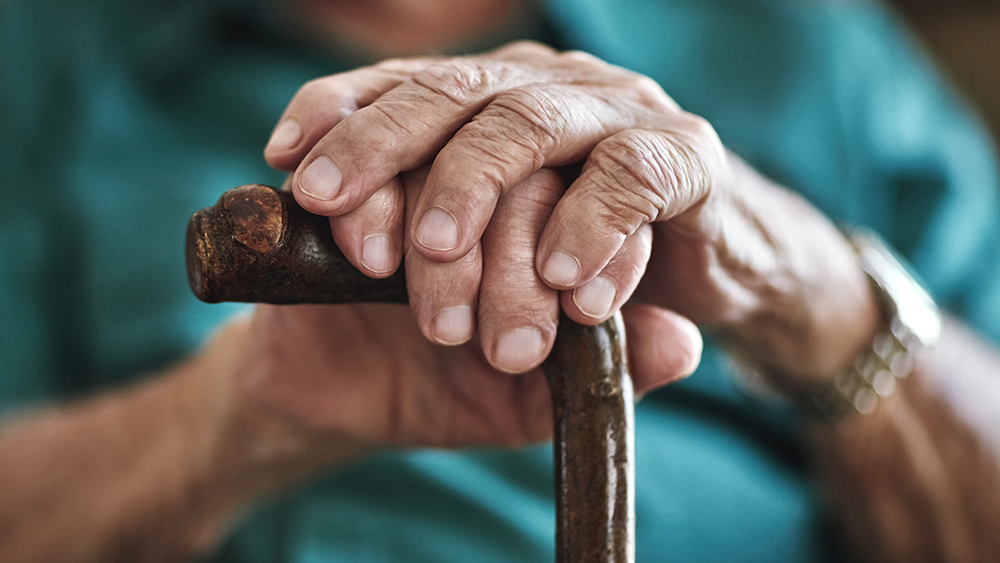Article Highlights
-
NIH is funding the Chicago COVID-19 Comorbidities (C3) study for five years to look at a range of long-term COVID-19 effects.
-
Adults age 55 and older with chronic conditions have been disproportionately affected by COVID-19.
-
Health care access, mental health, caregivers, and interventions are being studied.
Health services researcher and cognitive scientist Michael Wolf, Ph.D., M.P.H., has spent much of his career working with people with chronic conditions, looking for ways for health care systems “to make it easier for a patient to be a patient.” He and his colleagues at the Feinberg School of Medicine at Northwestern University in Chicago had been working with Chicago-area patients as part of four ongoing NIH-supported projects: one focused on health literacy and cognitive function in older adults, one on kidney transplant recipients, and the other two on how people with chronic conditions stick with their prescription regimens.
When the COVID-19 pandemic began to accelerate in the United States in March 2020, Wolf and his colleagues realized that these same participants could also share valuable information about their experience during the pandemic at a critical time: Cases were rising quickly, and in Illinois, a mixture of public health warnings, news reports, and word of mouth led to a lot of confusion.
On March 13, 2020, the researchers began a fast-moving survey of attitudes toward COVID-19 among current participants, conducting as many as 130 phone surveys each day. By March 20, they had talked to 637 participants. The first survey results of the new Chicago COVID-19 Comorbidities (C3) study were published on April 9, 2020 — 28 days after their first phone call.
Now the National Institute on Aging (NIA) has funded the C3 study to explore the effects of the COVID-19 pandemic over time. The researchers aim to better understand how adults age 55 and older with chronic conditions have managed their health care and personal health since the pandemic took hold in the United States in March 2020. The study will chronicle five years of people’s health experiences, including their ability to access medications and follow treatment plans through telehealth.

Michael Wolf, Ph.D., M.P.H. Photo courtesy of Michael Wolf.

Michael Wolf, Ph.D., M.P.H. Photo courtesy of Michael Wolf.
Helping Those at Highest Risk
As of January 2021, adults age 55 and older made up 94% of U.S. COVID-19 deaths. Of those who died, 92% had one or more underlying medical conditions that put them at higher risk.
Wolf and his colleagues were following these higher-risk patients long before the COVID-19 pandemic began. “A lot of our focus has been on access to health care, as well as self-management of chronic conditions and treatment adherence,” he said.
Some patients Wolf and his colleagues work with through the National Institute of Diabetes and Digestive and Kidney Diseases (NIDDK) TAKE IT clinical trial have kidney disease and received transplants. Between managing their kidney disease and stopping their immune systems from rejecting their new kidneys, these participants take an average of 10 medications a day. Others have cardiovascular disease or lung conditions, such as chronic obstructive pulmonary disease, which causes breathing problems and creates more risk for serious COVID-19 complications. More than two-thirds of the participants in the C3 study have three or more chronic conditions.
Along with having chronic conditions, the people involved in Wolf’s research represent a diverse slice of the Chicago area. Half of the cohort receive care through several Northwestern medical clinics, while the other half are patients at two health centers that care for medically underserved communities. About half of the participants are Black or Hispanic. Participants can speak either English or Spanish; 11% of those taking the survey reported that they had limited English proficiency.

The Chicago COVID-19 Comorbidities (C3) Study
The initial C3 study started a long-term effort to study COVID-19 in older people with chronic disease.
From Speedy Survey to Long-Term Research
For the 637 Chicago-area participants in the first C3 survey — and for most other people — the week of March 13, 2020, was confusing. The state of Illinois had yet to issue a shelter-in-place order. People wondered whether they should stay home or go about their business as usual. Should they worry more about washing their hands or washing their groceries? And what should they do if they were already dealing with health challenges?
Wolf’s survey chronicled some of this confusion. Although most participants had general concerns about COVID-19, the researchers found that about a quarter of survey respondents were very worried about being infected with SARS-CoV-2 (the virus that causes COVID-19), while another quarter had no concerns.
Wolf and his colleagues continued to check in with the participants two weeks, one month, and three months after the initial survey — a total of four surveys between March and July 2020. “We wanted to follow people over time,” he said. “We thought that was a contribution we could make.”
In August 2020, Wolf and his team received a two-year supplemental award from NIA to continue their work, as well as to expand their surveys to include participants in NIH-supported research projects in New York. The team conducted a fifth wave of surveys between November 2020 and March 2021, when Chicago experienced a surge of COVID-19 cases.
As the pandemic progressed, the researchers found different perceptions and behaviors around the pandemic linked to race, ethnicity, and health literacy. During the first year of the pandemic, both Black and Hispanic survey respondents continued to be more likely to report that they did not think they were likely to get the virus.
These differences could be for several reasons, Wolf said. Some participants were frontline workers who took precautions against the virus by masking at work. “They’re confident because they’re doing the things that they have been told they should be doing.” If participants don’t think they can do much to change their risk level, Wolf said, that may affect their perception of the virus. Living in multigenerational homes in urban Chicago or New York, a participant may try to follow government recommendations as best they can in close quarters but disregard them elsewhere.

The C3 study will chronicle the health experiences of people with underlying conditions over five years, including their ability to access medications and follow treatment plans provided through telehealth.

The C3 study will chronicle the health experiences of people with underlying conditions over five years, including their ability to access medications and follow treatment plans provided through telehealth.
Expanded Reach, Expanding Questions
Along with the participants’ health experiences, the researchers also started to look at other aspects of the pandemic’s impact for those with preexisting conditions. They found that anxiety and depression were both relatively common for their respondents in May 2020 and that these conditions caused difficulty in managing health and medications. People who experienced anxiety or depression worried more about being infected with COVID-19 and were more likely to say that they felt stressed or lonely than those who did not report experiencing these mental health issues.
In a recent wave of surveys, the researchers have found that one-third of their patient population is experiencing symptoms of post-traumatic stress disorder.
Following the research done in 2020 and 2021, the new five-year NIA award will allow the research team to continue conducting surveys through 2027 and expand to ask about more topics. They will also be able to look at their data alongside other research efforts in the United States, Europe, and Australia to see whether there are differences between the countries.
In the next round of surveys, Wolf and his team are looking at factors that could improve participants’ circumstances, from increasing social support to improving health literacy, which can influence both mental and physical health.
The research team also wants to learn more about how patients with chronic conditions are using — or struggling with — telehealth. Wolf would also like to interview the family members and loved ones who help participants with their health care, to learn more about how caregivers’ roles have been affected by the pandemic.
Tracking the Pandemic’s Long Arc
Because all of the participants are part of ongoing studies that began before the pandemic, the researchers have access to extensive health information across time, including health records, prescription information, and how often the participants see health care providers.
Wolf is particularly interested in how health care records can reveal patients’ evolving relationship with their health. Which patients are making use of telehealth appointments and other online tools successfully? Which ones haven’t been picking up prescriptions or getting in to see the doctor as often as they used to?
In addition to identifying and reaching out to people who’ve stopped getting necessary care. Wolf also wants to be able to pinpoint people struggling with pandemic-related mental health issues, specifically those who can’t bounce back from the pandemic’s mental and emotional distress without help. “Who are the people who are more likely to disappear? Our goal is to identify those individuals,” he said, “so that there can be outreach and public health support to help them recover.”
Sources
- Bailey, S. C., Serper, M., Opsasnick, L., Persell, S. D., O’Conor, R., Curtis, L. M., Benavente, J. Y., Wismer, G., Batio, S., Eifler, M., Zheng, P., Russell, A., Arvanitis, M., Ladner, D. P., Kwasny, M. J., Rowe, T., Linder, J. A., & Wolf, M. S. (2020). Changes in COVID-19 knowledge, beliefs, behaviors, and preparedness among high-risk adults from the onset to the acceleration phase of the US outbreak. Journal of General Internal Medicine, 35(11), 3285–3292. https://doi.org/10.1007/s11606-020-05980-2
- Lovett, R. M., Opsasnick, L., Russell, A., Yoon, E., Weiner-Light, S., Serper, M., Cooper Bailey, S., & Wolf, M. S. (2022). Prevalence of anxiety and depressive symptoms and impact on self-management among adults with chronic conditions in Chicago, Illinois, USA, during the COVID-19 pandemic: A cross-sectional survey. BMJ Open, 12(1), e052495. https://doi.org/10.1136/bmjopen-2021-052495
- O’Conor, R., Opsasnick, L., Benavente, J. Y., Russell, A. M., Wismer, G., Eifler, M., Marino, D., Curtis, L. M., Arvanitis, M., Lindquist, L., Persell, S. D., Bailey, S. C., & Wolf, M. S. (2020). Knowledge and behaviors of adults with underlying health conditions during the onset of the COVID-19 U.S. outbreak: The Chicago COVID-19 Comorbidities survey. Journal of Community Health, 45(6), 1149–1157. https://doi.org/10.1007/s10900-020-00906-9
- Opsasnick, L. A., Curtis, L. M., Kwasny, M. J., O’Conor, R., Wismer, G. A., Benavente, J. Y., Lovett, R. M., Eifler, M. R., Zuleta, A. M., Bailey, S. C., & Wolf, M. S. (2022). Trajectories of perceived susceptibility to COVID-19 over a year: The COVID-19 & chronic conditions (C3) cohort study. Medicine, 101(24), e29376. https://doi.org/10.1097/MD.0000000000029376
- Wolf, M. S., Serper, M., Opsasnick, L., O’Conor, R. M., Curtis, L., Benavente, J. Y., Wismer, G., Batio, S., Eifler, M., Zheng, P., Russell, A., Arvanitis, M., Ladner, D., Kwasny, M., Persell, S. D., Rowe, T., Linder, J. A., & Bailey, S. C. (2020). Awareness, attitudes, and actions related to COVID-19 among adults with chronic conditions at the onset of the U.S. outbreak: A cross-sectional survey. Annals of Internal Medicine, 173(2), 100–109. https://doi.org/10.7326/M20-1239
 An official website of the United States government
An official website of the United States government


